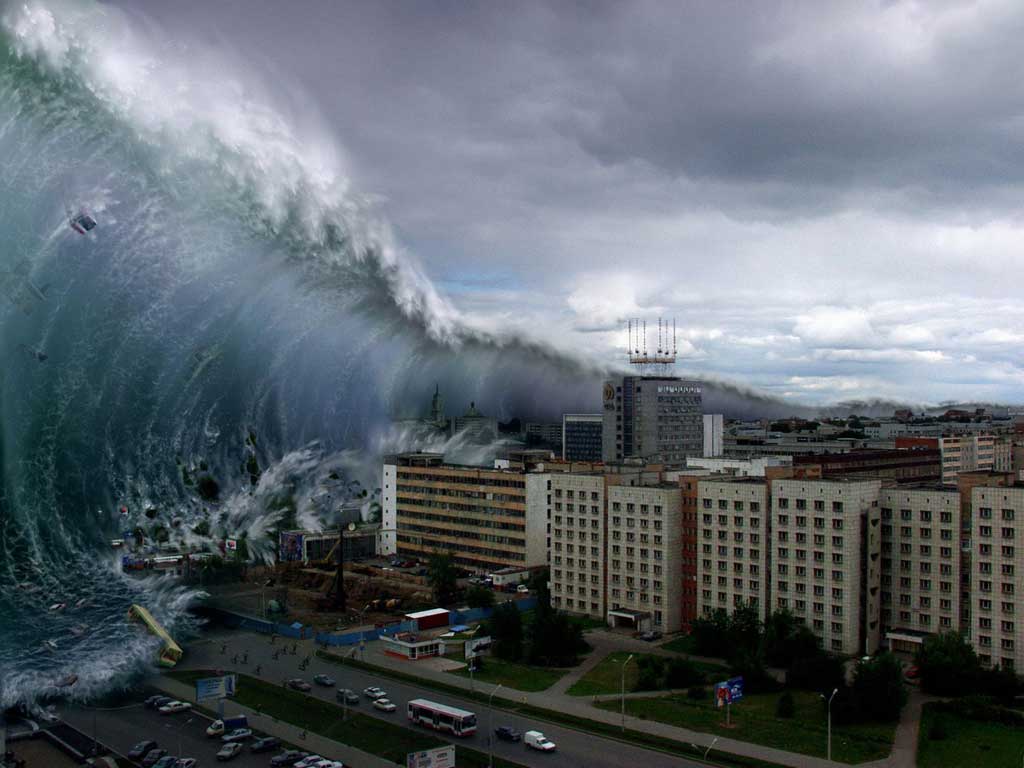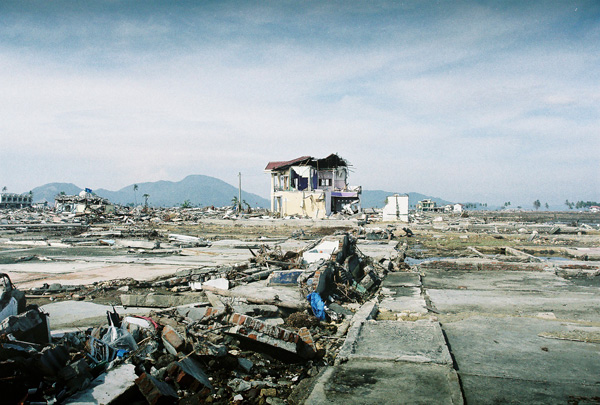Review: The Doors of the Sea

D.B. Hart’s treatise is a rejoinder to a problem perhaps as ancient as humanity itself: the philosophical problem of evil.
This earlier book by D.B. Hart, of Eastern Orthodox notoriety, is undeniably well-written but, at the same time, woefully underwhelming. The Doors of the Sea: Where Was God in the Tsunami? is a rejoinder to a problem perhaps as ancient as humanity itself: the philosophical problem of evil. This brief Christian apologia is a specific reaction to the tsunami disaster which thumped the island of Sumatra of western Indonesia in December 2004, laying waste to a quarter million people, 40% of which were children.
It’s a short read, at just 104 pages in length, though the sum of Hart’s theodicic denouements could be distilled to a trio of paragraphs, if not fewer. He fills the balance of the book with flowery prose and magniloquent diction which, while concordant with his other works, fails to elevate his reasoning to any higher significance. His cavernous vocabulary and polished writing are impressive in their own right, but ultimately serve no apparent purpose other than to cloak the tenuousness of his underlying arguments.
In responding to this greatest of theism’s challenges, Hart eschews any qualms in addressing the broad marketplace of worldviews — from the atheist to the materialist, the deist to the Christian theist. He pays little attention to nontheistic appeals, reserving his greatest admonishment for aberrant Christian theology, which he believes to be the larger problem. Hart takes specific contention with Calvinism, assailing its declaratively ‘unbiblical’ soteriology of limited atonement and double predestination in not particularly amicable language, and assumes an avuncular posture toward the John Pipers of evangelicalism who attempt to derive divine meaning and signs from natural catastrophe. He also gives preferential treatment, and rightly so, to the pangs of Dostoyevsky’s Ivan Karamazov as well as the deistic convictions of Voltaire.
The Privation Doctrine
Peeling past the layers of lofty speech reveals a frustratingly unsatisfactory and, indeed, historically banal strand of theology. While many of the classic approaches to the problem of evil are given their due, what is propounded here, at bottom, is an ectype of Augustinian theodicy circa 4th century, the idea that only good can come from God and evil is merely a privation of that goodness. Within this grid, evil is not viewed as a separate or distinct entity but relegated to various rungs in a hierarchy of goodness.
“This is not to say that evil is then somehow illusory; it is only to say that evil, rather than being a discrete substance, is instead a kind of ontological wasting disease.” (p. 73)
Leaving aside that this stands in direct contradiction with Isaiah 45:7, this of course begs the question. If God is the provenance only of good, from what or from whom does its inverse emanate? According to Hart, evil and suffering are the sole properties of the forces of evil, the “demonic powers” of one kingdom which are perpetually at war with the “angelic powers” of another. He cites a litany of biblical passages to support this claim (Col. 1:16, 1 Cor. 2:8, Eph. 1:21; 2:2; 3:10; 6:12, Gal. 4:3, John 12:31; 14:30; 16:11, 2 Cor. 4:4, and 1 John 5:19).
“The cosmos, then, is divided between two kingdoms, that of God and that of death.” (p. 66)
Concerns over biblical authority notwithstanding, what he has posited is that there exists a realm of disharmony completely sealed off from all human apprehension and sense experience, and the entirety of reality is characterized by this eternal conflict between mystical forces, evil and good. The problem I see with this argument is not only are the entities upon which it is based immune to verifiability or falsifiability (as all religious asseverations tend to be), but that it actually doesn’t explain anything; it only regresses the problem (and evil itself) to another ill-defined, nebulous entity or entities. It is but a sleight-handed, duplicitous attempt to disencumber God of his accountability for evil, conceding only that God permits suffering but does not will it.
There seems to be a more fundamental and manifestly conspicuous problem here, however, with attributing the source of evil to entities which are not God. If God is the creator of all, then these entities must have been part of that creation (unless of course one wishes to subscribe to paganistic and animistic religious traditions where the powers of good and evil have always coexisted in a state of existential turmoil). The implication by those championing this brand of theodicy is that the world could not have been created any other way. It is supposed that the entities responsible for evil and the physical forces precipitating natural disasters were somehow necessary elements of a free creation. The only remaining options are that God otherwise made a mistake and should not have created these entities in the first place, or that this all amounts to bloated theologizing in order to cover for an imaginary entity.
The Dilemma of Non-Intervention
If you swallow this theology in gross and thus ground human suffering in St. Paul’s “mystical forces,” one burdensome question looms just around the corner. This still does not explain why if God is in fact all-powerful does he not intervene in the most opportune of moments to relieve his creation of the undue misery and calamity knocking daily at our doors. Why — why indeed — did he not stay the cataclysmic waves of the Sumatran tsunami and “keep the sea within its appointed bounds?” (p. 2) The age-old dilemma continues to hold sway: either God is not omnipotent and is powerless at halting these atrocities or, if he is all-powerful, is an inexplicably capricious being whose intervention in humanity is random, arbitrary or altogether absent. Epicurus espied this contradiction from the 3rd century BCE.
Instead of engaging this issue, Hart lambastes the impotent or evil dichotomy, saying it is a fallacious question to even ask, as it is “premised upon an inane anthropomorphism.” Hart writes:
“Unless one can see the beginning and end of all things, unless one possesses a divine, eternal vantage upon all of time, unless one knows the precise nature of the relation between divine and created freedom, unless indeed one can fathom infinite wisdom, one can draw no conclusions from finite experience regarding the coincidence in God of omnipotence and perfect goodness.” (pp. 13-14)
His acrimonious stance toward this issue is beleaguered by a dual irony. First, he grounds his entire solution to the problem of evil in the Bible, which regularly speaks of God in human-centric language (“God is a jealous and vengeful God” –Nahum 1:2-8; “I regret that I have made [human beings]” –Gen. 6:6-7). The second shot of irony is that his attempt to promote a frictionless theodicy in this book is in fact an attempt at grappling with this intractable impasse. In a certain sense all of what we discuss about God and the supernatural are misguided anthropomorphisms, so why even endeavor to write a book if the very concept eludes conceptualization?
Hence we still do not have a theologically defensible reason for the abundant absence of intervention across history. Hart certainly doesn’t have an answer, urging us to “shed the burden of the desire for total explanation…” (p. 68) Rather, he assures us that it will all be worth it in the end. According to Hart, it is the God of Christianity that will intervene in the end of days to execute a final and universal harmony among his creation and the powers beyond our purview.
“…all wounds will at the last be healed, all scars will disappear, all discord will vanish like a mirage, and that such will be the splendor of the finale of all things, when that universal harmony is established.” (p. 38)
It is certainly a chipper thought. But is this notion — the long con of redemption — sufficient to expiate the suffering endured by the victims described in Dostoyevsky’s writings, or for the unfeeling reprobates who inflicted such undue harm, or for the untold desolation and agony to which life has been subjected across the vast expanse of geologic time? This final question is one which resonates fully with Hart, and he proceeds to engage it accordingly. He tells us either we accept that we’re accompanied by evil and all will be brought to light and restored in the end, or we must conclude that evil is too execrable a byproduct of freedom of the will to warrant the creation of life in the first place.
“One is confronted with only this bare choice: either one embraces the mystery of created freedom and accepts that the union of free spiritual creatures with the God of love is a thing so wonderful that the power of creation to enslave itself to death must be permitted by God; or one judges that not even such rational freedom is worth the risk of a cosmic fall and the terrible injustice of the consequences that follow from it.” (p. 69) He concludes that “the rejection of God on these grounds cannot really be a rational decision, but only a moral pathos.”
Hart then offers a silver lining stemming from the ubiquity of evil, but one that won’t be fully realized until the end of the natural order. It’s the idea that the depths of good cannot be apprehended without first realizing the depths of evil, a sort of metaphysical catch-22. He tells us our eternal happiness will be amplified tenfold once final victory in Jesus is accomplished as, without our exposures to evil, we would be unable to fully appreciate the extent of the infinite goodness awaiting us.
“…thereby in the profoundest mystery of redemption, and advancing the venerable homiletic conceit that our salvation from sin will result in a higher beatitude than could ever have evolved from an innocence untouched by death.” (p. 28)
One point which refuses to fade from rational consideration, and which can scarcely be overstated, is the utter lack of evidence for the ethereal entities upon which all such belief systems are predicated. This static reality is one with which all patrons of faith must continually come to terms, from the layperson all the way up to the ivory-towered theologian. A well-reasoned, copacetic theology is, at its core, still merely an attempt to reconcile and reinforce its underlying assumptions, which have nary a shred of evidence. Each successive paroxysm like the one endured by the Indonesian peoples demands those of faith reevaluate their worldview and ask how a supposedly omniamorous God fits into the equation of life’s drama.
Moreover, the loftiness of a theological argument has no bearing whatsoever on its truth value. One cannot make a myth true by developing more sophisticated polemic. Hart seems to acknowledge this, midway through the book: “To put the matter starkly, nature is a cycle of sacrifice, and religion has often been no more than an attempt to reconcile us to this reality.” (p. 52) Indeed, though man’s religious beliefs and theological acrobatics have grown more nuanced, more refined and ever more balkanized all at the same time, the amount of evidence for the underlying beliefs has remained unchanged.
Closing Thoughts
In closing, The Doors of the Sea is a provocatively written treatise on the problem of evil but one which ultimately fails to capture anything new that hasn’t been propounded several times before. Were it not a targeted response to the devastating Indonesian tsunami event of 2004, this might be mistaken for a facsimile, more or less, of far earlier theodicic works littering the libraries of those of us well-seasoned in dialogues of this variety. That said, for those never before exposed to these types of arguments, or to Eastern Orthodox theology writ large, this may very well represent a beacon of perspicacity among the glut of pro-materialist accounts being pushed today.
D.B. Hart is one of the more eloquent religious philosophers of our time, but a book of theology should do more than double as a pocket thesaurus. A well written book fails to be something more when it is bereft of substance, new knowledge, or fresh approaches to old knowledge. Newness and freshness are not what you’ll find here. The Christian still subscribes to the idea of an omnipotent master, a personal deity intimately concerned with human affairs, yet the earth is still riven by evil and suffering of the highest order, with no apparent intervention of any kind.
To be sure, this is a book not on the existence of God but on the nature of God. But before it is deemed purposeful to theorize one’s nature or eternal plan, shouldn’t we first confirm that such an entity is even there? As the late Nobel Prize-winning physicist Richard Feynman declared when asked what he would say to God if given the chance: “You should have given us better evidence.”
Image via National Geographic
Image by Radio Nederland Wereldomroep
Image via Standford.edu
Note: This review is mirrored over at Goodreads and at Amazon.





Comments